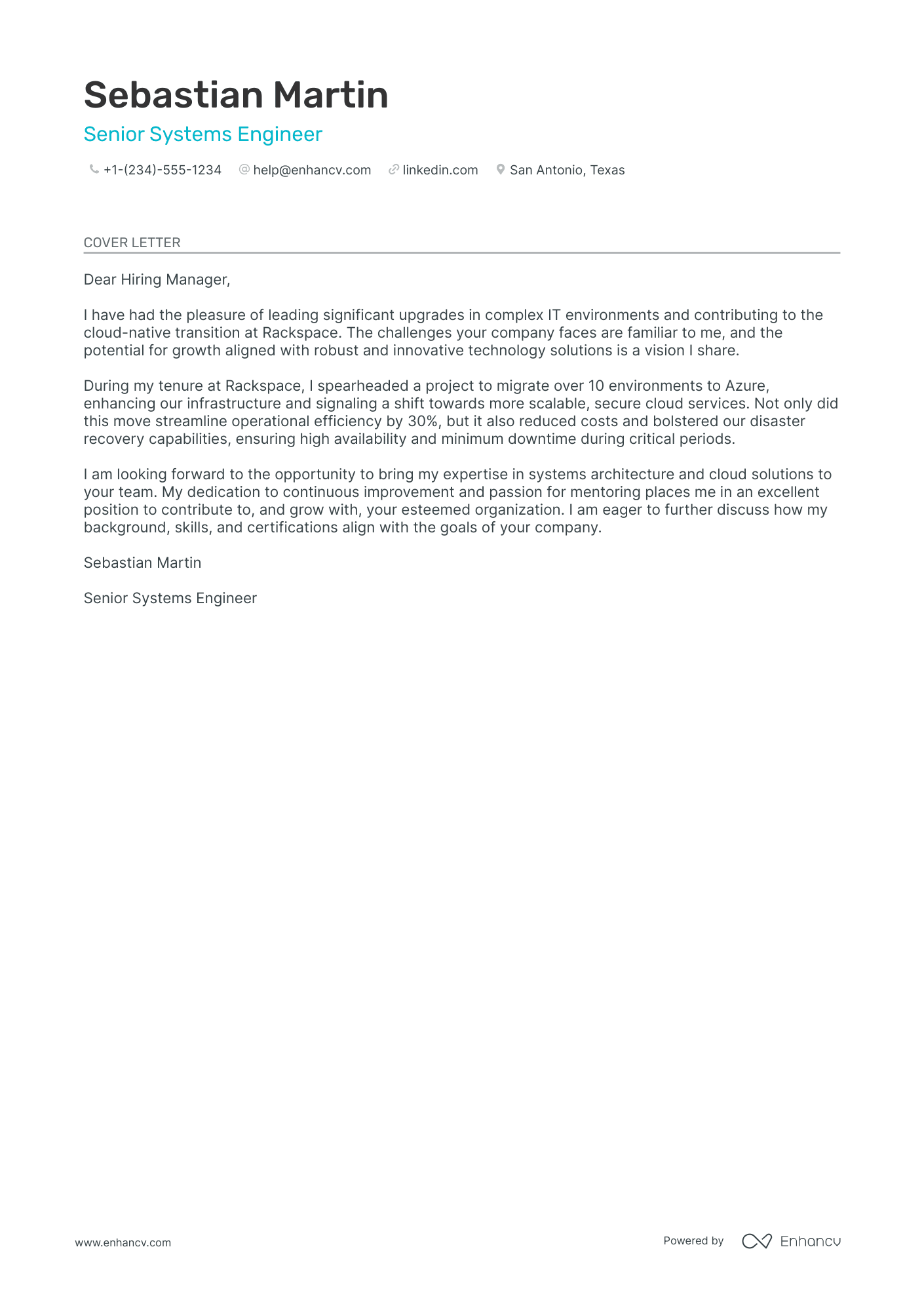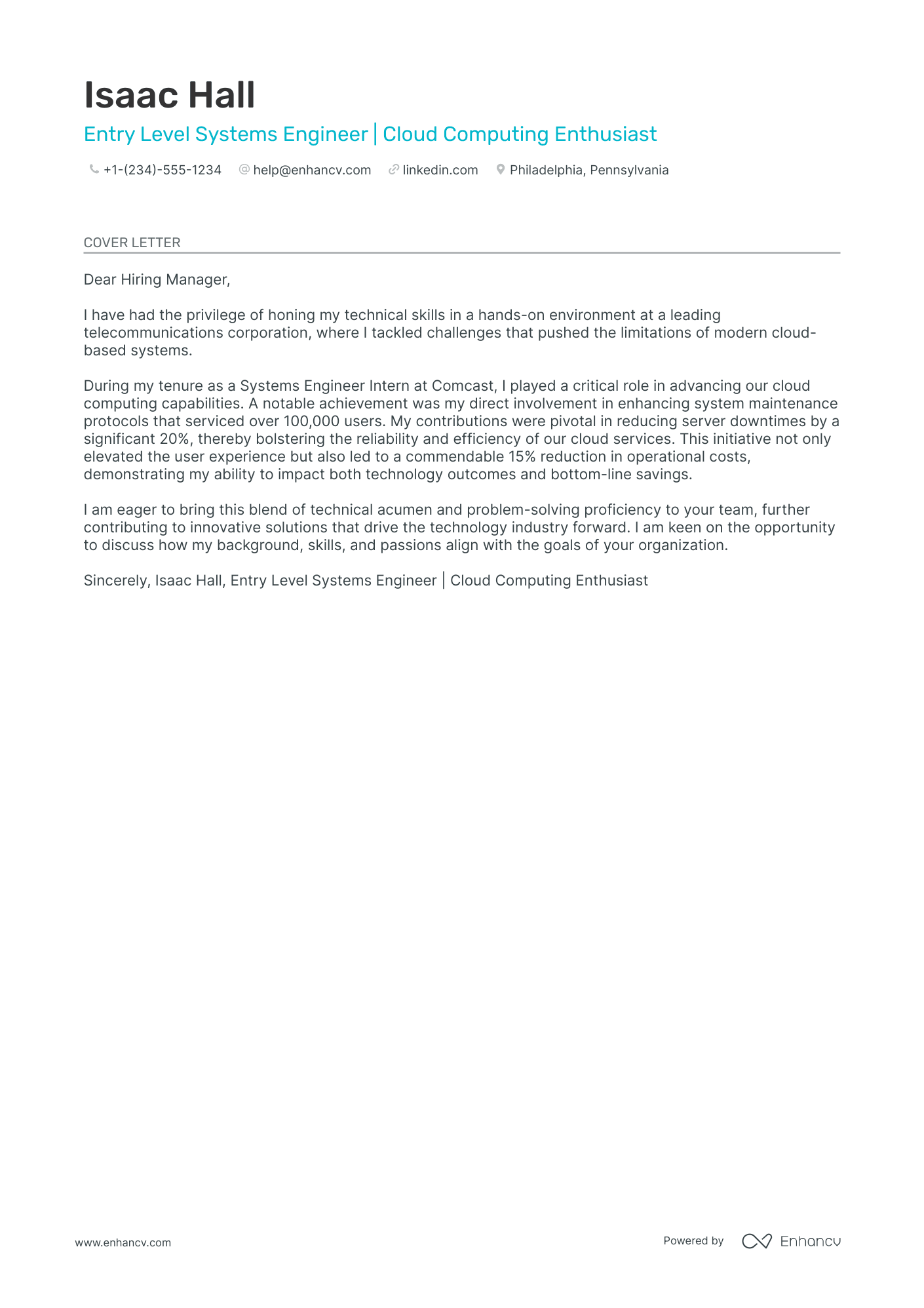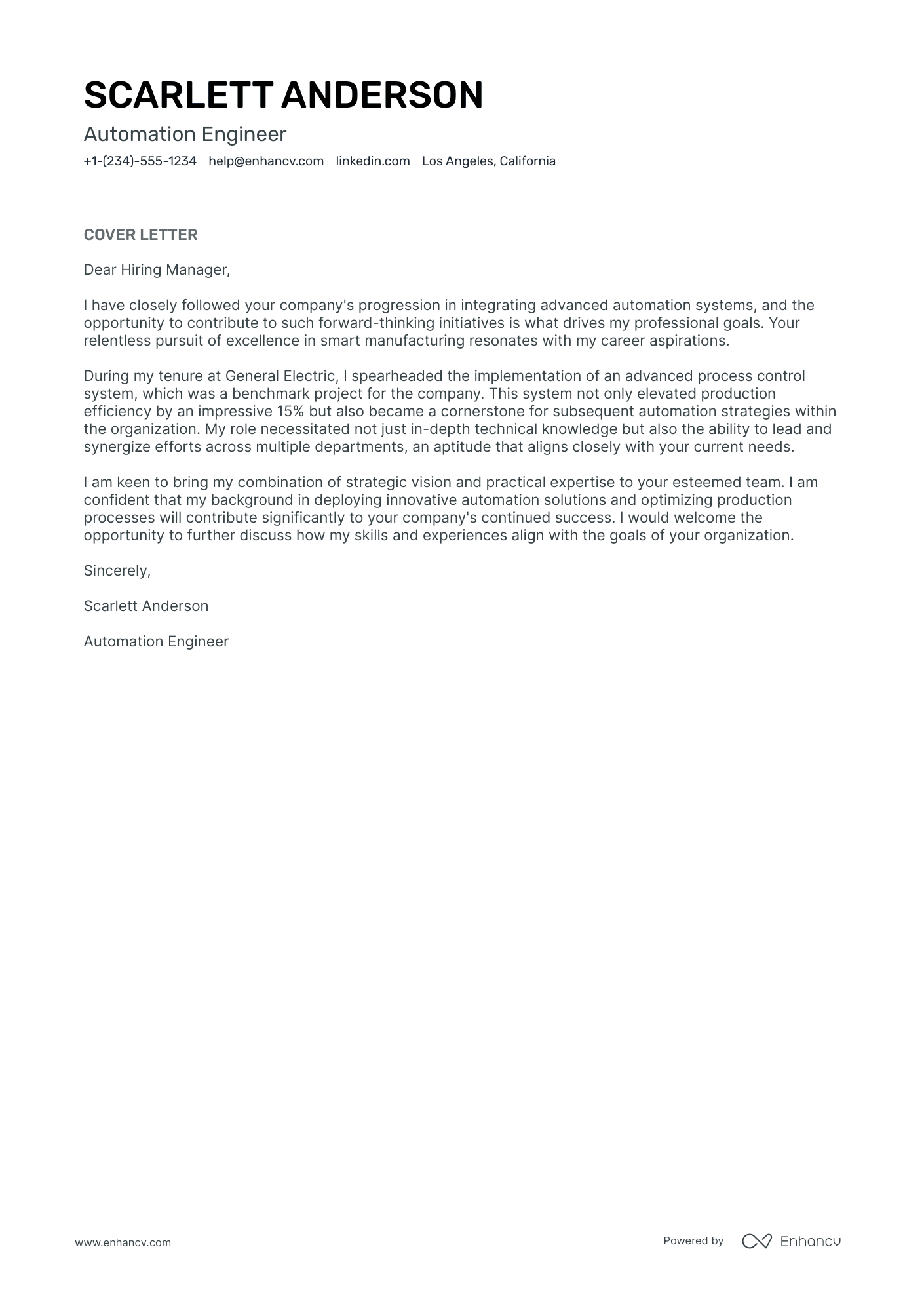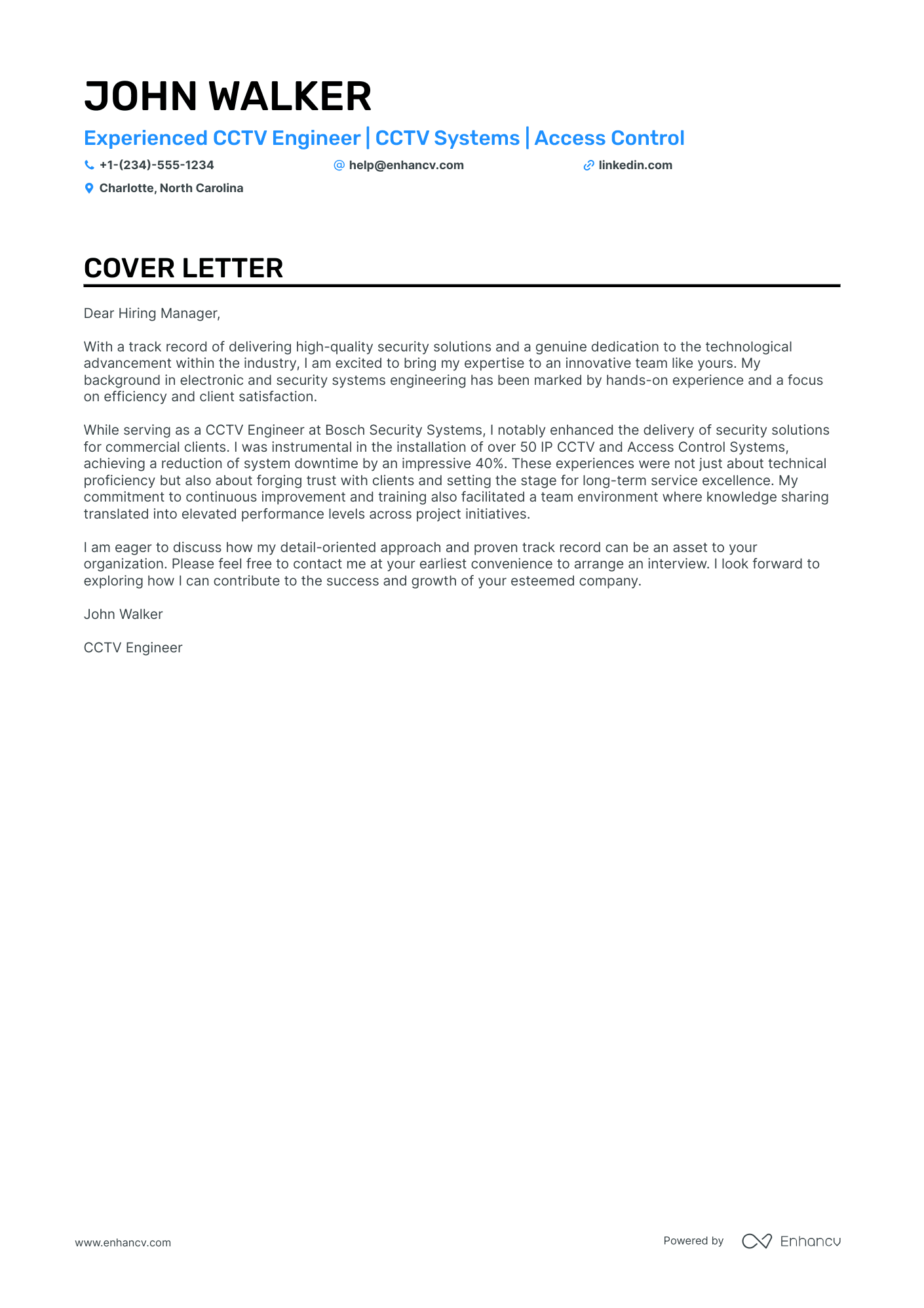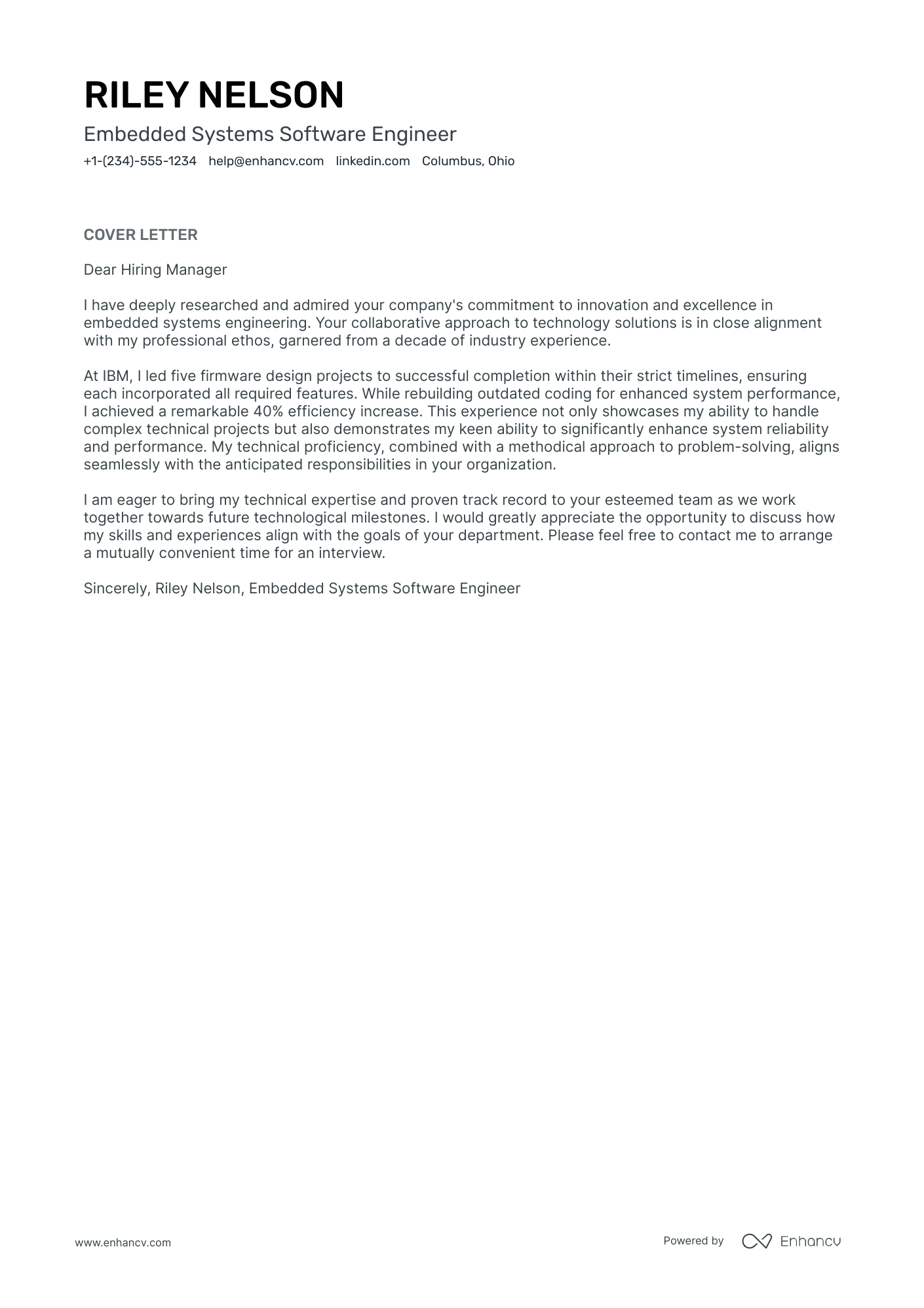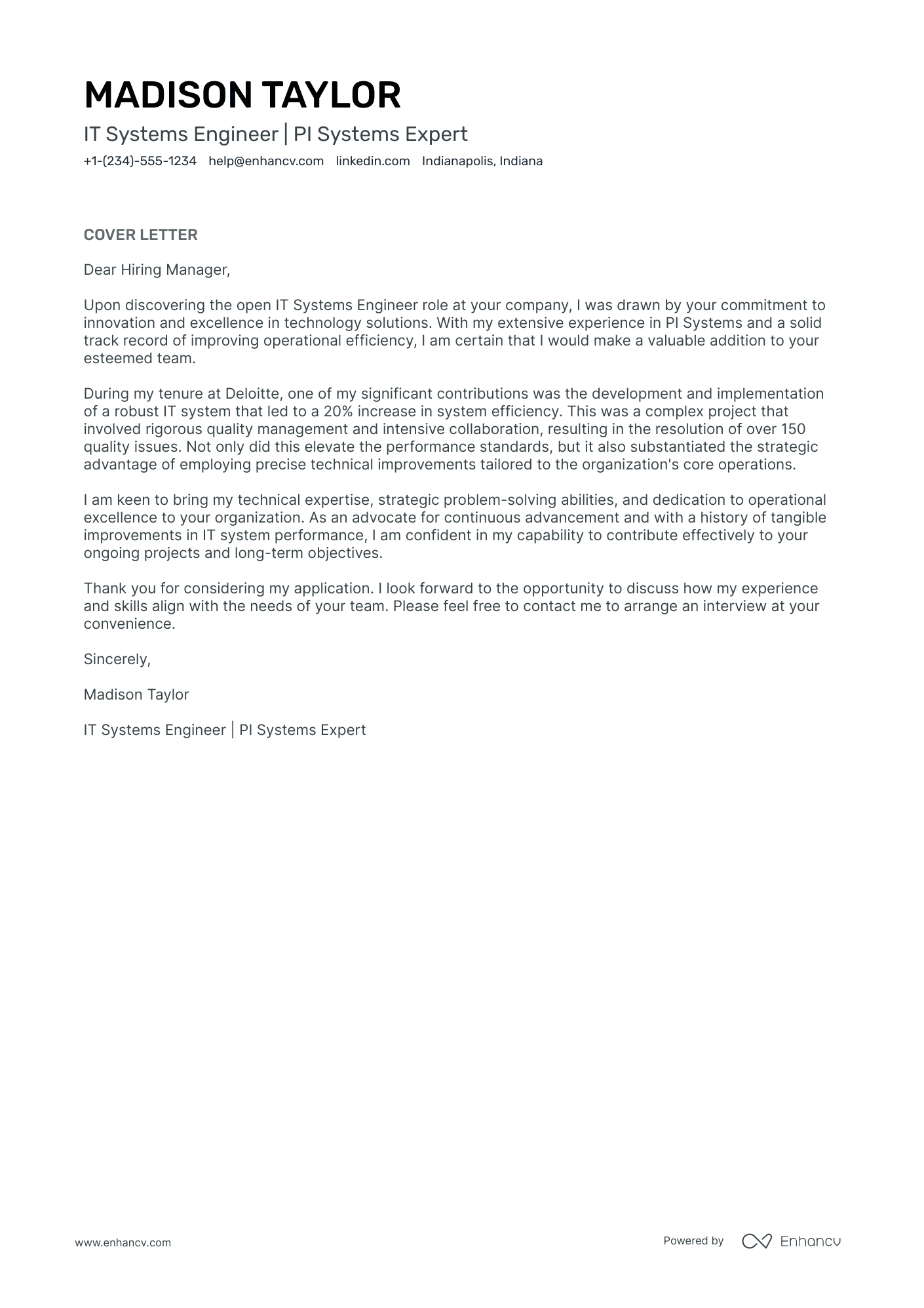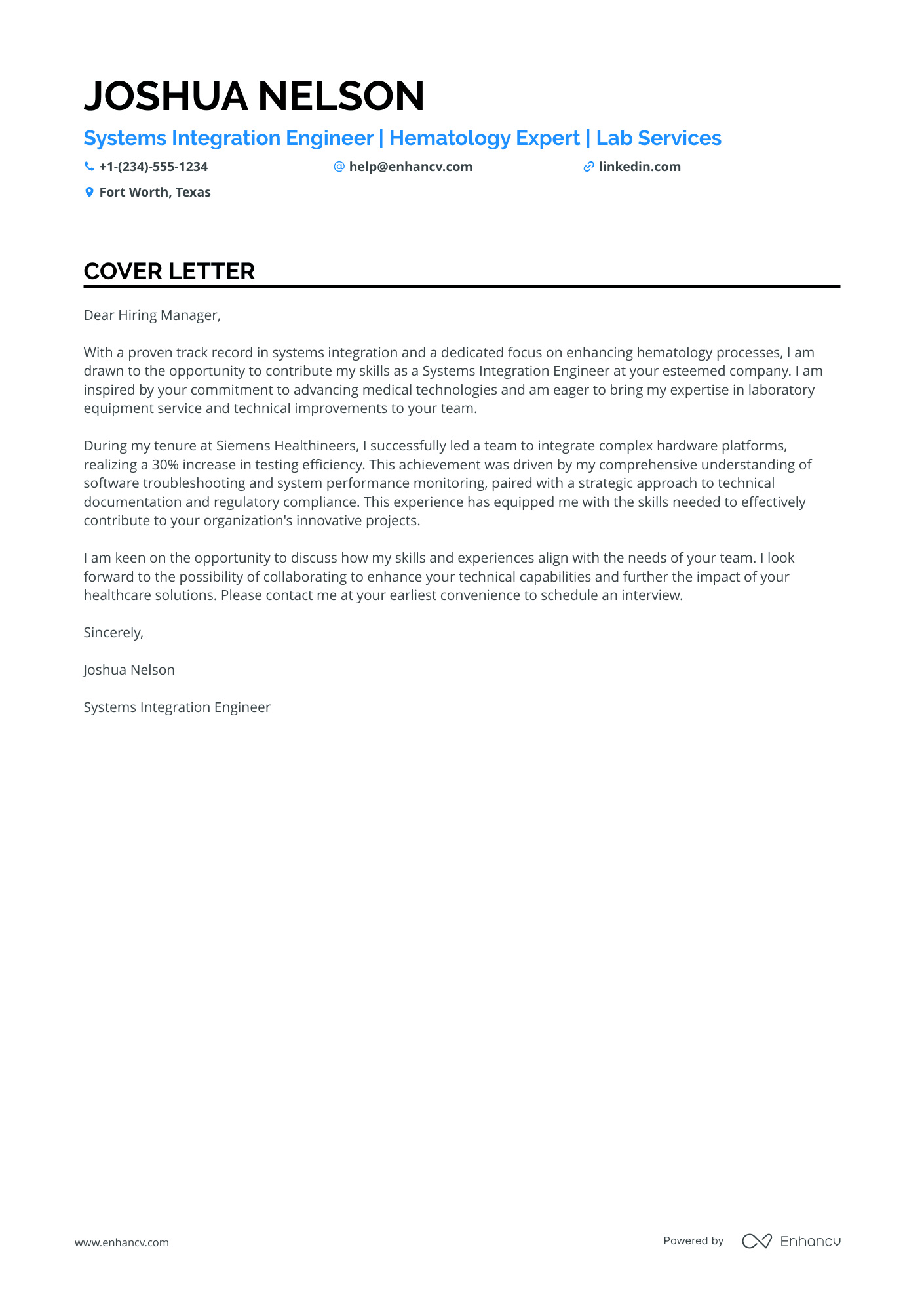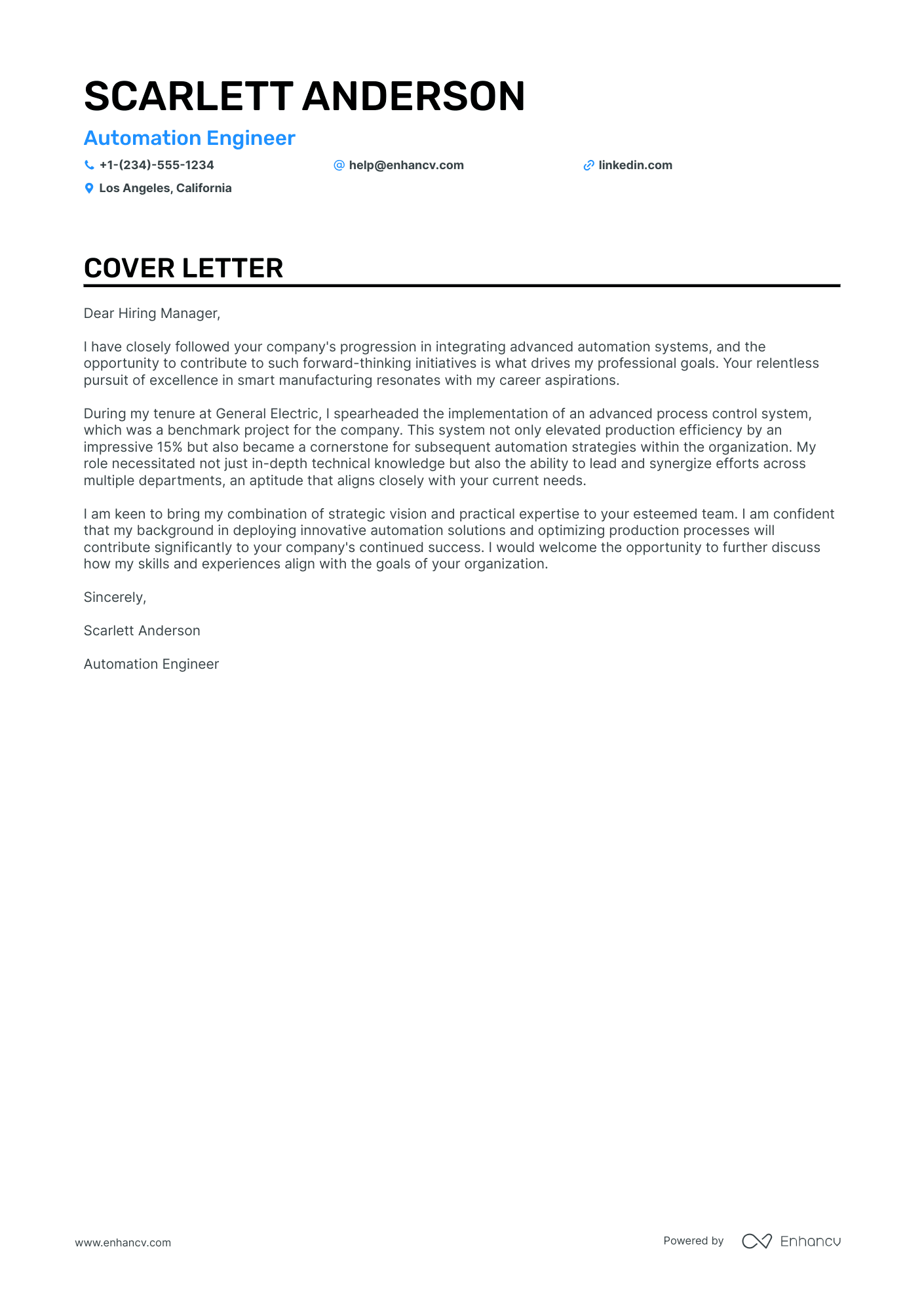You're ready to send out your resume for that perfect systems engineer role, but then you see it: "Cover letter required." Writing this crucial document can feel daunting—it's your chance to shine beyond your resume and share your proudest professional achievement. Remember, your cover letter should engage with a personal success story without echoing your resume, steer clear of worn-out phrases, and keep things concise—no more than one page. Let's craft a cover letter that opens doors.
- Create a systems engineer cover letter to persuade the recruiters you're the best candidate for the role;
- Use industry-leading systems engineer cover letter templates and examples to save time;
- Dedicate your systems engineer cover letter space to your best achievement;
- Make sure your systems engineer cover letter meets recruiters' expectations and standards.
Avoid starting at the blank page for hours by using Enhancv's AI - just upload your resume and your systems engineer cover letter will be ready for you to (tweak and) submit for your dream job.
If the systems engineer isn't exactly the one you're looking for we have a plethora of cover letter examples for jobs like this one:
- Systems Engineer resume guide and example
- Director of Engineering cover letter example
- Biomedical Engineer cover letter example
- Automotive Engineering cover letter example
- Audio Engineer cover letter example
- Petroleum Engineer cover letter example
- Aerospace Engineering cover letter example
- Product Engineer cover letter example
- Engineering Project Manager cover letter example
- Entry Level Mechanical Engineer cover letter example
- Senior Engineer cover letter example
Drop your resume here or choose a file.
PDF & DOCX only. Max 2MB file size.
Systems engineer cover letter example
TIMOTHY DUNCAN
Rio de Janeiro, Brazil
+1-(234)-555-1234
help@enhancv.com
- Demonstrating Relevant Experience: The cover letter effectively showcases the candidate's role in a significant project with a substantial budget, underlining his capacity for high-stakes decision-making and aptitude in requirement analysis, which are critical for a system engineer's role in a SaaS-focused company.
- Quantifiable Achievements: By citing a specific accomplishment, such as reducing risks by 100% across 50 applications, the applicant provides measurable results that can give the hiring manager a clear view of the candidate's potential impact on their organization.
- Industry-Specific Knowledge: The candidate expresses familiarity with the company's integration of SaaS solutions, suggesting a strong understanding of the current market and technological trends, which is essential for a system engineer involved in developing cutting-edge technologies.
- Proactive Approach: The cover letter closes with an invitation for further discussion, signaling the candidate's enthusiasm and willingness to take initiative in securing the role, while being respectful of the hiring manager's schedule.
The must-have sections and format of your systems engineer cover letter
When writing your systems engineer cover letter, keep in mind that it'll only be read by the recruiters and not the Applicant Tracker System (or software used to assess your profile). That's why you should structure your content with a/an:
- Header (apart from your contact information, include your name, the role you're applying for, and the date);
- Personalized salutation;
- Opening paragraph to win the recruiters over;
- Middle paragraph with key details;
- Closing that starts from clichés;
- Sign off (that's not mandatory).
Industry standards dictate your paragraphs to be single-spaced and to wrap your content in a one-inch margin. Designing your systems engineer cover letter, refer to one of our templates, which automatically takes care of the spacing and margins.
Choose the same font for your systems engineer cover letter as you did for your resume: the likes of Lato and Bitter would help you to stand out in a sea of cover letters in Arial or Times New Roman.
Export your whole systems engineer cover letter from our builder in PDF to keep the same formatting and image quality.
Writing a cover letter is easy with our free cover letter generator. Make one in seconds from your resume.
The top sections on a systems engineer cover letter
- Header: Include your contact information and the date, which ensures that the recruiter can easily follow up with you after reading your cover letter.
- Greeting: Address the recruiter or hiring manager by name if possible, as it demonstrates that you've taken the time to personalize your cover letter and are serious about the position.
- Introduction: Begin with a compelling statement about your interest in systems engineering and summarize your most relevant experiences that make you a strong candidate for the role.
- Body: Detail your systems engineering qualifications, including your technical skills, problem-solving abilities, and experiences with designing, integrating, and managing complex systems, to showcase your fit for the specific requirements of the job.
- Closing: End your cover letter with a thank you, a reiteration of your enthusiasm for the position, and a call to action, such as expressing your eagerness to discuss your qualifications in an interview.
Key qualities recruiters search for in a candidate’s cover letter
Proficiency in systems modeling and simulation: Demonstrates the ability to create accurate models for complex systems, enabling effective prediction of system behavior under various conditions.
Experience with systems integration: Highlights the practical knowledge of bringing together subsystems into one coherent system, ensuring that they function together seamlessly.
Strong technical troubleshooting and problem-solving skills: Essential for identifying, diagnosing, and rectifying complex technical issues that may arise within multi-component systems.
Knowledge of system engineering methodologies (e.g., Agile, Waterfall, V-Model): Shows an understanding of various frameworks for system development, which guides a project from conception to completion.
Excellent interdisciplinary communication: Indicates the ability to effectively convey complex technical information to stakeholders and team members from different technical backgrounds.
A track record of managing the entire lifecycle of a system: Encompasses activities from system conception, design, development, production, operation, support, and disposal, demonstrating a holistic view and understanding of system development.
What greeting should you use in your systems engineer cover letter salutation
A simple "Hello" or "Hey" just won't work.
With your systems engineer cover letter salutation, you set the tone of the whole communication.
You should thus address the hiring managers by using their first (or last name) in your greeting.
But how do you find out who's recruiting for the role?
The easiest way is to look up the role on LinkedIn or the corporate website.
Alternatively, you could also contact the organization via social media or email, for more information.
Unable to still obtain the recruiter's name?
Don't go down the "To whom it may concern path". Instead, start your cover letter with a "Dear HR team".
List of salutations you can use
- Dear Hiring Manager,
- Dear [Company Name] Team,
- Dear [Hiring Manager's Name],
- Dear [Department Name] Hiring Committee,
- Dear [Job Title] Search Committee,
- Dear [Mr./Ms./Dr.] [Last Name],
Get creative with your systems engineer cover letter introduction
Recruiters are going to assess plenty of candidate profiles for the role. Thus, anything you do to stand out will win you brownie points.
Use your systems engineer cover letter introduction to share something memorable about your experience.
But before you go down the rabbit hole of creativity and humor, align your message with the company culture.
For example, if you are applying for a role in some startup, use those first two sentences to tell a funny story (about your experience) to quickly connect with the recruiter.
Storytelling in the middle (or body) of your systems engineer cover letter
You've got your whole resume sorted, detailing your achievements and skills. What else can you write in your systems engineer cover letter?
For starters, take the time to re-assess the job requirements and re-discover the most crucial skills and requirements (or keywords).
After making a list of these important keywords, look back on your experience to select just one of your past accomplishments.
Choose the achievement that is the most noteworthy, relevant to the role, and matches the required skills.
Use the next between three and six paragraphs to narrate how:
- you've grown your skill set, thanks to your achievement;
- you'd use the know-how you've gained in your new role;
- your accomplishment could help your potential employers grow.
Remember that recruiters don't need a retelling of your whole resume, but want to find out what makes you, you.
Two ideas on how to end the final paragraph of your systems engineer cover letter
Closing your systems engineer cover letter, you want to leave a memorable impression on recruiters, that you're a responsible professional.
End your cover letter with how you envision your growth, as part of the company. Make realistic promises on what you plan to achieve, potentially, in the next six months to a year.
Before your signature, you could also signal hiring managers that you're available for the next steps. Or, a follow-up call, during which you could further clarify your experience or professional value.
No experience systems engineer cover letter: making the most out of your profile
Candidates who happen to have no professional experience use their systems engineer cover letter to stand out.
Instead of focusing on a professional achievement, aim to quantify all the relevant, transferrable skills from your life experience.
Once again, the best practice to do so would be to select an accomplishment - from your whole career history.
Another option would be to plan out your career goals and objectives: how do you see yourself growing, as a professional, in the next five years, thanks to this opportunity?
Be precise and concise about your dreams, and align them with the company vision.
Key takeaways
Summarizing the most important aspects in writing your systems engineer cover letter, remember to:
- Create a personalized systems engineer cover letter for each role you apply for, that includes the recruiter's name in the salutation;
- Format your systems engineer cover letter with single-spacing, one-inch margins, and a modern, yet ATS-friendly font;
- Always start off your systems engineer cover letter with two sentences that reflect what is most important about your application;
- Your systems engineer cover letter body should feature your biggest accomplishments and the job-relevant skills it has taught you;
- Instead of opting for the "Sincerely yours" ending, close your systems engineer cover letter with a nod to the future with what you aim to achieve in this potential role.
Systems Engineer cover letter examples
By Experience
Senior Systems Engineer
Entry Level Systems Engineer
By Role
Control Systems Engineer
CCTV Systems Engineer
Embedded Systems Engineer
IT Systems Engineer
Systems Integration Engineer
- Highlighting Proven Experience: The letter emphasizes the applicant's track record in systems integration, which is directly relevant to the role. This builds credibility and assures the hiring manager of the candidate's capabilities.
- Demonstrating Specific Achievements: Mentioning the 30% increase in testing efficiency with a previous employer underlines the candidate’s ability to deliver tangible improvements, which is crucial in a technical role.
- Aligning with Company Goals: Expressing admiration for the company's commitment to medical technology advancement aligns the applicant’s goals with the company's mission, demonstrating a genuine interest in the role and organization.
- Technical and Strategic Skills: The letter highlights a combination of technical skills in software troubleshooting and system monitoring, alongside strategic skills in documentation and compliance, showing an all-rounded capability to address complex challenges.
